
SUBTEXT E-Newsletter Fall 2014

Welcome From Our Chair
KEEPING IN TOUCH
By María Bullón-Fernández, Chair 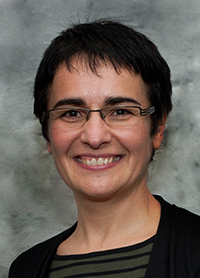 Dear Alumni,
Dear Alumni,
Welcome to our 2014 issue of Subtext! From retirements to awards, from faculty publications to student and alumni news, we have much to share with you.
Let me start with bittersweet news. Two of our faculty, Professors Bill Taylor and John Bean, retired at the end of this past June. Respected and admired by students and faculty alike, recipients of numerous awards for their work, both Professor Taylor and Bean have made a profound impact on our Department and on Seattle University. Professor Bean’s knowledge of teaching and learning is unparalleled and has helped all his colleagues be much better teachers. His generosity toward both faculty and students has been extraordinary. Professor Taylor has been at Seattle University for more than 50 years and has taught thousands of students. The creativity he has brought to his courses has been a source of inspiration for both faculty and students. While both professors have taught a wide variety of courses, many of you will remember them for their exciting and stimulating courses on Shakespeare, Milton, or Spenser. We will sorely miss them, but we are all left with feelings of gratitude for all we have learnt from them. Their example will always inspire us to continue to be absolutely committed to student learning, to be dedicated to students and our larger community, to nurture our desire to learn even if, or precisely when, it leads us to stretch personally and intellectually. We all wish them the best as they enter the next phase in their lives as faculty emeriti. If you’d like to join us in wishing them well, feel free to send them an e-mail. Professor Bean’s address is jbean@seattleu.edu and Professor Taylor’s is btaylor@seattleu.edu.
Our Department does have sweet news to share as well. Last year we proposed creating a new minor in Writing Studies and it was approved by the university. For more on the minor, which is set to start this Fall, see the piece by its Director, Dr. Johnson Bube, in this issue of Subtext. Our faculty received several awards: Dr. Koppelman received the College of Arts and Sciences Teaching Award, Dr. Smith received the students’ Advisor of the Year Award, and Dr. Kill received the Award for Advancing Inclusion in Academic Life. English faculty also continued to be very active in their research. This year our faculty published three books, several articles, and creative works and also gave presentations at numerous conferences. Several of our students also went to conferences, received awards, and graduated with honors. Additionally, even as Professors Bean and Taylor retire, we have already hired a new faculty who will teach Early Modern Literature, particularly Shakespeare. We are excited to welcome Dr. Allison Meyer.
This academic year, 2014-15, we will be conducting two Program Reviews: one for English and English/Creative Writing and a separate one for Film Studies. As part of the Program Review process, it is crucial that we hear from our alums. Those of you who graduated after 2004, the year of our last review, will probably have received an alumni survey by the time you receive this issue of Subtext. Thank you for filling it out. Your feedback will influence the future direction of the Department.
We would also love to hear from you with regard to a new feature we are adding to our departmental website. Our current students are eager to learn about the many career options they will have as English and English/Creative Writing grads. We are therefore inaugurating a new page on our website called Our Alumni at Work. We will be featuring you, our alums, and the different careers and jobs you have chosen. Please drop us a line at english@seattleu.edu if you’d like us to include you in our new section.
The effort to connect you with current students has to do with our Department’s commitment to continue to promote the importance of the Humanities. I am sure you have heard, read about, or participated in the national debate about the “decline of the Humanities.” Much has been written and discussed about the changes in student interest, about the impact of the recession on the choices students make with regard to their major. It is clear that the world around us is changing and that both students’ backgrounds and students’ interests are changing. We in the Department are responding to these changes by engaging in curricular review and responding to students’ interests and needs in new ways, including emphasizing professional preparation. It seems, though, that the notion that has been floated around that the Humanities are not needed any more is, fortunately, starting to be seen as misguided at best and dangerous at worst. Businesses are realizing that they need employees who know how to use language consciously, effectively, and creatively, and who have some basic cultural and historical literacy. Scientific organizations and companies that depend on scientists are realizing that scientists need to think creatively and deeply; they are realizing that much, if not most, of what they do is focused on advancing human knowledge, and, what is human knowledge without the human? It seems that perhaps the tide against the humanities is starting to turn, at least for now. We in the English Department are committed to continue to educate our students and the public on the importance of educating citizens who are both effective and creative users of language and storytelling. We hope that you, our alums, are also joining us in this important endeavor.
Department News
What Professor John Bean Misses Most About Teaching
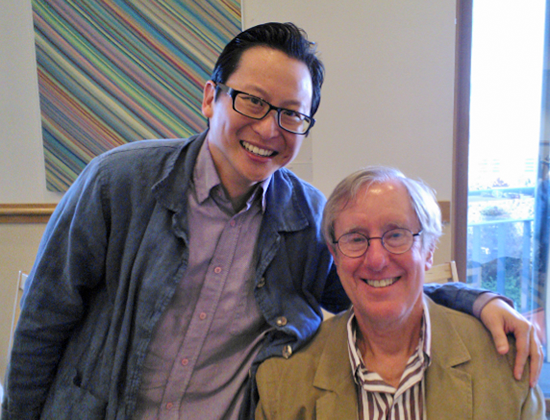
When friends ask me what I miss most about teaching, my answer may not be what they expect. What I miss most is the class discussions that follow small group work. Anyone who has had me for a course will recall the rhythm of my teaching, which tries to engage students with our discipline's "beautiful problems" (How are we to regard Caliban in The Tempest ? Is Milton's view of Eve misogynistic?). Students first explore their views individually in one-page "thinking pieces" and then in small groups, where I often ask them to create a consensus thesis statement and an argument (minority reports allowed). While the small groups are working, I often leave the room (happy if the noise level is high, anxious if it is not.) The pleasure for me is the rich class discussions that follow group presentations. The groups often disagree, reproducing in class the alternative readings that anticipate the debates in our scholarly journals. Group work helps students find their own voices, empowering them to articulate and defend their own close readings of a text. I become simply one voice in a conversation sustained by students who are becoming expert insiders in our discipline. I often emerge from these whole class discussions with my own views of the text changed by student arguments.
My love of these moments is linked analogously to what I most miss about my English Department colleagues: The wonderful life-changing (for me) discussions of how to create assignments and teaching methods that deepen our students' learning.
Professor Bill Taylor Reflects on Seattle U Then and Now
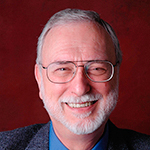 Sentimentality is the death of art, but under these circumstances, it's hard for me not to indulge myself in a little sentiment. Having spent 75 percent of my life on this campus, the prospect of leaving it has generated some emotions that are new to me.
Sentimentality is the death of art, but under these circumstances, it's hard for me not to indulge myself in a little sentiment. Having spent 75 percent of my life on this campus, the prospect of leaving it has generated some emotions that are new to me.
Naturally, I have been looking back over these 62 years since I entered SU as a freshman in 1952. And I recall one specific event, a tiny moment, but it has stuck with me. On a warm evening early in the fall of my freshman year, I indulged in a moment of nostalgia, in advance. As I walked along the mall in front of the Admin building (which was then the rear of the building), I looked up at the copula with its cross, and I thought what a good place I was in in my life. I wondered how this scene would look and feel to me in the years to come. And I have had that thought, and that experience, many times since, though it has changed somewhat over the years. But I wasn't prepared for how much it has now changed. Recently, after an evening class, I looked up at that cross again, and revisited that memory of more than 60 years ago. It felt very Proustian.
Looking back now brings to mind everything this place was to me then…So what still remains of the campus I first saw? Not much. Among our present buildings that did not then exist, are the Lemieux Library, the Student Center, the Pigott Building, Bannan and the Engineering Building, the Chapel of St. Ignatius, the Connolly Center, the Lee Theater, Casey, Loyola Hall, Campion, Bellarmine, the Murphy Apartments. The women's dorm then was Marycrest, on the west side of Broadway, on ground now covered by the Swedish Hospital. [But] as I look up at the cross on the Admin Building now, it seems to me not to have changed at all. There's a metaphor in that. Perhaps a truer measure of the time that has passed is that beautiful Redwood tree on the south side of Pigott, nearly twice as high as the building itself. In my earliest memories of Pigott, that tree was less than half as tall as the building. I don't quite understand that metaphor myself, but it feels right.
Professor Kate Koppelman Will Become Seattle University’s Newest Core Director
 Dr. Kate Koppelman will begin her role as Associate Director of the University Core this September—taking over the role of Core Director in the fall of 2015. Dr. Koppelman is the second English faculty member to lead the University Core; Professor David Leigh, SJ, was the Core’s very first director, from 1989-1999. And, importantly, Dr. Koppelman will be the first woman to serve in this position. The university’s core curriculum provides the foundation for SU’s liberal arts education and serves all undergraduate students in the university. The core curriculum emphasizes inquiry—teaching students how to ask productive questions so that they might become active participants in their education. The English department is thrilled to have Dr. Koppelman—an award-winning teacher and passionate advocate for the importance of literature and cultural studies—in this important leadership position.
Dr. Kate Koppelman will begin her role as Associate Director of the University Core this September—taking over the role of Core Director in the fall of 2015. Dr. Koppelman is the second English faculty member to lead the University Core; Professor David Leigh, SJ, was the Core’s very first director, from 1989-1999. And, importantly, Dr. Koppelman will be the first woman to serve in this position. The university’s core curriculum provides the foundation for SU’s liberal arts education and serves all undergraduate students in the university. The core curriculum emphasizes inquiry—teaching students how to ask productive questions so that they might become active participants in their education. The English department is thrilled to have Dr. Koppelman—an award-winning teacher and passionate advocate for the importance of literature and cultural studies—in this important leadership position.
The English Department Welcomes New Faculty Member Allison Meyer
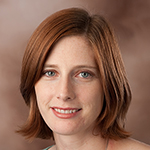 Dr. Allison Machlis Meyer joined the English Department as an Assistant Professor this fall. Her research and scholarship focus on Renaissance drama and poetry, historical narratives, intertextuality, and composition and rhetoric. She received her Ph.D. in English from the University of Illinois at Urbana-Champaign with a graduate minor in Gender and Women’s Studies. Most recently, Dr. Meyer was Assistant Professor of English at Assumption College where she taught courses in early modern literature, critical theory, women's studies, and writing, and served as the College's Composition Coordinator. She looks forward to sharing SU's excellent special collections with students in her classes.
Dr. Allison Machlis Meyer joined the English Department as an Assistant Professor this fall. Her research and scholarship focus on Renaissance drama and poetry, historical narratives, intertextuality, and composition and rhetoric. She received her Ph.D. in English from the University of Illinois at Urbana-Champaign with a graduate minor in Gender and Women’s Studies. Most recently, Dr. Meyer was Assistant Professor of English at Assumption College where she taught courses in early modern literature, critical theory, women's studies, and writing, and served as the College's Composition Coordinator. She looks forward to sharing SU's excellent special collections with students in her classes.
Meyer’s recent scholarship includes “Richard III’s Forelives: Rewriting Elizabeth(s) in Tudor Historiography” in Medieval and Renaissance Drama in England (2013), and “The Politics of Queenship in Francis Bacon’s The History of the Reign of King Henry the Seventh and John Ford’s Perkin Warbeck” in Studies in Philology (2014). She is currently working on a book project titled Tell-tale Women: Chronicling Gender, Politics, and Intertextuality in Early Modern Historiography.
In the summer of 2014, Dr. Meyer was selected for a National Endowment for the Humanities Summer Seminar, entitled ”Tudor Books and Readers: 1485-1603.” The program was held at the Plantin-Moretus Museum in Antwerp, Belgium; at Senate House Library, University of London; and at the Bodleian Library, University of Oxford. She is now incorporating her NEH summer research on early modern readers, book history, and the materiality of sixteenth-century books into her early modern literature courses.
The English Department Announces Its New Writing Studies Minor
The English Department proudly announces its newest program, the Writing Studies Minor, which highlights effective writing in academic progress, professional success, and civic engagement. With this program, we are joining a national trend in promoting analytic study and applied training in written communication. We aim to bolster student preparedness for graduate school and for careers in humanities, law, business, teaching, the arts, environmental studies, the non-profit world, or government.
Through foundational courses in argumentation and grammar, editing, and style, and additional courses in rhetorical traditions, genres and practices, and rhetoric and cultural studies, the Writing Studies Minor cultivates a valuable rhetorical perspective about the role that language plays in shaping reality and in getting work done in world. It seeks to equip students to effectively communicate and to become more versatile, reflective, and sophisticated writers. To that end, courses expose students to the field of writing and rhetoric in its historical, theoretical, and cultural contexts, and to foster a rhetorical understanding of the relationship between language, literacy, culture, identity, and power. Courses give students practice with argumentation, professional writing, creative nonfiction, personal essays, and other genres. Internships will be encouraged.
PEP Talks
Last year, we launched a new series of events: the Profession, Education, Publication (or “PEP”) Talks. The PEP Talks series was designed to offer students something different than the traditional literary reading. These talks are delivered by working professionals in the industry and offer students practical information that they can use to promote their own publishing and career objectives. The 2013-14 PEP Talk speakers included Jason Black, a book doctor; Peter Bagge, graphic novelist and Visiting Writer at Seattle University; and Hollis Wong-Wear, Grammy-winning lyricist and musician, and a Seattle U grad, who took many courses in the English Department.
Hollis Wong-Wear’s visit was a perfect way to round out our first year of the PEP Talk series. Her presentation was thorough, direct, and encouraging—an impressive balance to strike. At that same time that she gave students a sense of the challenges of making it as a self-sponsored artist, she also offered a huge array of tips for success. It was terrific to hear from a recent Seattle U graduate how it's possible to make it in today's world of publishing and entertainment. And what was Hollis' best advice? Work hard, and work together. A willingness to take on new things and to collaborate with other artists, she says, have been the keys to her success. As a collaborator with Macklemore and Ryan Lewis, Wong-Wear certainly knows something about working together!
PEP Talks will continue in 2014-15 school year. We have plans for presentations from the editor of a small press, from a hybrid author (i.e. someone who is publishing both traditionally and via self-publishing), and an SU grad who now runs a business that helps authors locate publishing options.
Faculty and Staff Achievement
John C. Bean, emeritus professor of English, had a productive final year at Seattle University. Since last fall, he has given keynote addresses or conducted workshop/consulting visits at New Mexico State University, Indiana University, Wilfred Laurier University (Canada), University of Waterloo (Canada), University of Toronto (Canada), University of the Fraser Valley (Canada), and the University of Idaho. In June, he also presented three days of writing-across-the-curriculum workshops for faculty at Ashesi University in Ghana. In addition to textbook revision with his co-author and colleague June Johnson Bube, he has co-authored two articles that have either appeared or are forthcoming in The Journal of Economic Education; “Using Graphic Assignments to Promote Deep Learning of the Market Mechanism” (with Gareth P. Green, Brian D. Kelly, and Dean J. Peterson); and “Deep Learning in Intermediate Microeconomics: Using Scaffolding Assignments to Teach Theory and Promote Transfer” (with Gareth P. Green and Dean J. Peterson).
Molly Clark Hillard published her book, Spellbound: The Fairy Tale and the Victorians with The Ohio State University Press in February 2014. Dr. Hillard also received the Dean’s Research Fellowship for the summer of 2014. The grant allowed her to hire and collaborate with a research assistant (English major Elizabeth McGregor) on an essay about the intersections between Victorian literature and Kazuo Ishiguro’s contemporary novel Never Let Me Go, and a new class, titled “Victorian Afterlives,” which will be offered this winter. Finally, Dr. Hillard received funds to research and develop a new Study Abroad course in South Africa. While on her two-week visit, Dr. Hillard met with wildlife conservation and human rights groups, notably the Global White Lions Trust, a non-profit organization that protects the white lion of South Africa and runs a primary school for children in need. When this course takes place, students will read literature and perform service learning that focuses on South African social and environmental justice. Among her SU grantors are the College of Arts and Sciences, the English Department, Women and Gender Studies, and the Center for Environmental Justice and Sustainability.
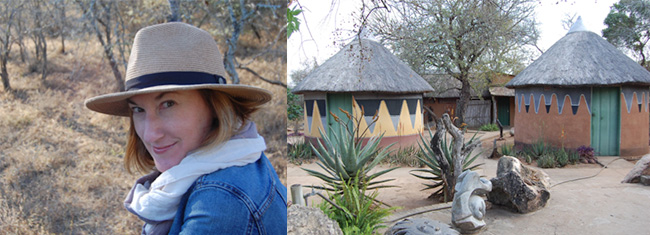
Victoria Kill received this year’s Faculty Award for Advancing Inclusion in Academic Life, which “recognizes a Seattle University faculty member who has demonstrated a commitment to inclusion of LGBTQ perspectives in the classroom through teaching, curriculum development, expansion of degree programs, or advocacy on campus.” The award was presented at the Office of Multicultural Affairs’ 2014 Lavender Celebration in June. Nominators particularly remarked on her UCOR 1100 course, “Uncovering Civil Rights,” which includes a section on trans rights. One of her nominators said, “Professor Kill ensures that students in her class, ‘Uncovering Civil Rights,’ are educated on the issues that impact the LGBTQ community. But beyond that, she pushes us to be inclusive and empathetic toward all difference.”
Kate Koppelman won the College of Arts and Sciences’ Outstanding Teaching Award in spring of 2014. The award is given annually to a faculty member whose courses are recognized by students and faculty alike as being uncommonly rigorous and challenging, and whose delivery of these courses is again recognized by students and faculty members as having a major impact on the intellectual, spiritual, and/or personal development of the students.
Georg Koszulinski is currently in post-production on a feature-length documentary that focuses on Vodou practices in rural Haiti, titled Loa: the Sacred Spirits of Haiti. The final film in his trilogy of Florida docs, Last Stop, Flamingo, continues to make the festival rounds, winning Best Documentary at the 26th annual U.S. Super 8 Film & Video Festival and Best Feature Film at the 8th annual Indie Grits Film Festival. His feature doc about a combat marine turned peace activist, Scott Camil Will Not Die, won the Audience Choice Award at the 5th annual Cinema Verde Environmental Film and Arts Festival. His recent experimental film and video works were programmed at a number of festivals and art spaces this past year including The International Experimental Cinema Exposition's Alternative Measures Film Festival, ICDOCS, Artist Television Access' Other Cinema film series, and Dallas VideoFest 27—the longest running video festival in North America. This past spring, The Journal of Short Film released Georg’s 16mm collage film, Message from my Centenarian, through its quarterly DVD anthology.
David Leigh, S.J. recently published “The Philosophy and Theology of Fyodor Dostoevsky,” in URAM Journal: Studies in the Philosophy of Understanding. He also has another article on Carl Jung’s perspectives on religion and literature in the Vol. 33, No 3-4 issue of the same journal appearing later this fall. A chapter titled “The Changing Practice of Liberal Education and Rhetoric in Jesuit Education, 1600-2000” will be published in a collection of essays, Traditions of Eloquence: Jesuits and Rhetorical Studies, by Fordham University Press in 2015. His book review on Dana Moore’s life of poet Denise Levertov appeared in America (2013), and one on Wesley Kort’s Textual Intimacy on autobiography, will soon appear in Literature and Religion.
Stephanie Lewis, the English Department’s Administrative Assistant was recognized as the 2014 Staff Member of the Year by the Student Executive Council of the College of Arts and Sciences. Stephanie just started at Seattle University in September of 2013 and was honored to be recognized by the students as “a person who they felt was particularly helpful and supportive in their academic careers” in her first year.
Sean McDowell recently published two poems in Vine Leaves Literary Journal and four poems in two issues of Clover, a literary rag. Last spring, he received a Catholic Thought and Culture Faculty Research grant for a project on Jesuit poet and martyr Robert Southwell. In light of his contributions to Renaissance studies, he was named the program chair of the 64th meeting of the South-Central Renaissance Conference (SCRC), which will be held in Raleigh, North Carolina. He will become the president of the SCRC in 2016. In addition to serving as an assistant textual editor of the Variorum Edition of the Poetry of John Donne, he has been asked to serve as an associate commentary editor of the Divine Poems volume, and will write the complete critical commentary on “Goodfriday, 1613. Riding Westward.” Meanwhile, the Writers’ Workshop in Ireland enjoyed its 20th anniversary last summer. Prof. McDowell and former Washington State Poet Laureate Sam Green celebrated the occasion with a conscientious group of students in Dublin, Galway, and Inis Mór.
Susan Meyers published two books this fall: her award-winning first novel, Failing the Trapeze, as well as an ethnography about education in Mexico. Failing the Trapeze, which won the 2013 Nilsen Award for a First Novel, tells the story of 15-year-old Theresa Williams, who discovers a suicide body in her family’s front yard during the summer of 1979. Her combined sense of terror and intrigue sends her down a frightening path of investigation into her family’s complicated history, full of secrets, backwoods shootouts, and botched circus performances. In Del Otro Lado: Literacy and Migration Across the U.S.-Mexico Border, Professor Meyers tells a very different kind of story: one about the challenges that rural Mexican students face, both in their home country and when they migrate to the United States. This year, she is promoting her new books both locally and at such locations as Wyoming’s Equality State Book Festival and the African Centre for Migration and Society in Johannesburg, South Africa. In addition, Professor Meyers was awarded a fellowship from the Jack Straw Writers Program and Artist Trust this past year, and she became the director of the Creative Writing Program as of July 1st. Be sure to save the date for our celebrations of Dr. Meyers' new books, both of which will take place on Thursday, January 22nd, 2015. The presentation of Del Otro Lado: Literacy and Migration Across the U.S.-Mexico Border will take place at Seattle University in Casey Commons from 3:45 to 4:45 pm followed by a reading and discussion of Failing the Trapeze at 5 pm, which will be hosted off-campus at Elliott Bay Bookstore, 1521 10th Avenue.
Mary-Antoinette Smith was recognized as the 2014 Advisor of the Year by the Student Executive Council of the College of Arts and Sciences. Her summer was equally rewarding. Dr. Smith was one of 16 summer scholars selected to participate in a four-week National Endowment for the Humanities Seminar titled “Performing Dickens: Oliver Twist and Great Expectations on Page, Stage, and Screen” at UC Santa Cruz. Key components of the seminar were sessions on melodrama and tableaux (playfully reflected in the group photo).
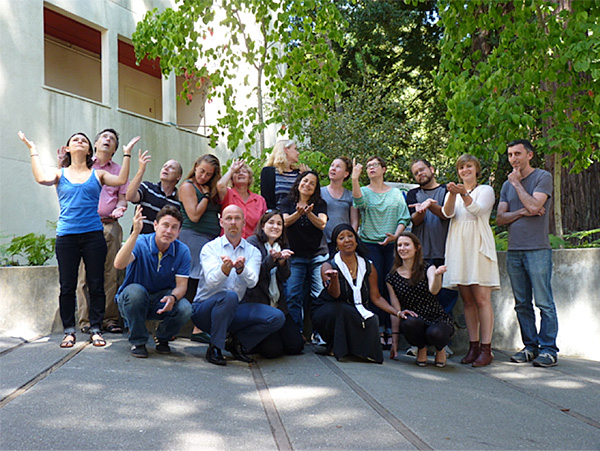
Charles M. Tung’s article, “Modernism, Time Machines, and the Defamiliarization of Time”—the introduction to his book—was accepted for publication by the Society for Science, Literature, and the Arts’s journal Configurations. With the 2014 A&S Summer Faculty Research Fellowship, he completed a chapter on telescopes, the distant view, and aesthetic scale. This fall, he will present a paper, “Deep Historicism and the Pale Blue Dot,” at the Modernist Studies Association conference, where he organized a panel on the inhuman turn. He was invited to give a paper next spring at the Paleofuturism Seminar hosted by the Commonwealth Center for the Humanities at the University of Louisville.
Student of note
Elizabeth MacGregor (Class of 2015) was selected to work as research assistant for Dr. Molly Clark Hillard, recipient of the Dean’s Summer Research Fellowship. The Dean’s fellowship was created for collaborative research between students and faculty. In addition to apprenticing with Dr. Hillard on her summer research project, MacGregor served as student advisory in Dr. Hillard’s creation of a new class. Finally, MacGregor produced an original, research-focused essay in Victorian literary studies. She will apply to present her research at one of the national or regional undergraduate research conferences.
Featured Alumni
Mehron Abdollmohammadi (Departmental Honors ‘11) received his Master’s degree at NYU’s Gallatin School, completing his thesis, “Generous Narcissism,” in 2013. He is currently completing Ph.D. applications with a project tentatively titled "Architecture, Space and Memory." Abdollmohammadi performs and lectures regularly in New York City and has recently been working as a research assistant to professor Carolyn Dinshaw in the NYU English Department.
Olivia Hernández (Departmental Honors ‘12) completed her first year of a Ph.D. in English at the University of Washington. Her course work this year covered American modernisms, postcolonial studies, hybrid languages, and the standardization of English. Next year, she will write her Master’s degree essay on the representation of the Chicano/a family in bilingual children's literature. Her doctoral dissertation will build on her SU honors thesis, focusing on expressions of mestiza identity in contemporary Latino/a literature.
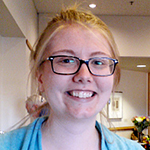 Willa McAllister (Departmental Honors ‘14) was accepted to the Master of Library and Information Science program at the University of Washington, her first choice school. She plans to specialize in adult services in public libraries. In the future, she would like to work in a public library situated in a community that has a large Spanish-speaking population. Having grown up in a small community that was divided by language, she wants to use her graduate training and eventual library career to outreach to and aid integration of language-divided communities.
Willa McAllister (Departmental Honors ‘14) was accepted to the Master of Library and Information Science program at the University of Washington, her first choice school. She plans to specialize in adult services in public libraries. In the future, she would like to work in a public library situated in a community that has a large Spanish-speaking population. Having grown up in a small community that was divided by language, she wants to use her graduate training and eventual library career to outreach to and aid integration of language-divided communities.
Lindsey Walker 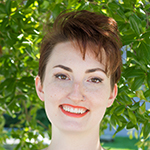 (Departmental Honors ‘14) transferred to Seattle University in 2012 from North Seattle Community College where, while studying nursing, she took a writing class for fun. She was hooked, and decided to pursue writing seriously. She graduated in June after an ambitious senior year. Walker, who worked full-time as an esthetician throughout college, learned that her salon was closing. So, last September, she and a colleague opened Idunn Salon and Spa in Queen Anne. (In Norse Mythology, Idunn was keeper of the apples that kept the gods eternally young.) She also did a work-for-hire project, writing one-line poems for a recipe book that comes with the Sweet Spot Ice Cream Maker. Meanwhile, she entered the Departmental Honors program and completed her honors project, a poetry chapbook, under the direction of Dr. Cumberland. How does Walker juggle all of this? “Setting goals, following through, and sleep is for suckers.”
(Departmental Honors ‘14) transferred to Seattle University in 2012 from North Seattle Community College where, while studying nursing, she took a writing class for fun. She was hooked, and decided to pursue writing seriously. She graduated in June after an ambitious senior year. Walker, who worked full-time as an esthetician throughout college, learned that her salon was closing. So, last September, she and a colleague opened Idunn Salon and Spa in Queen Anne. (In Norse Mythology, Idunn was keeper of the apples that kept the gods eternally young.) She also did a work-for-hire project, writing one-line poems for a recipe book that comes with the Sweet Spot Ice Cream Maker. Meanwhile, she entered the Departmental Honors program and completed her honors project, a poetry chapbook, under the direction of Dr. Cumberland. How does Walker juggle all of this? “Setting goals, following through, and sleep is for suckers.”
Walker’s philosophy is to “go all-in” on everything she chooses to do, never shirking studying or reading. That attitude paid off in April when she presented in all three categories—literary criticism, poetry, and creative non-fiction—at the Northwest Undergraduate Conference on Literature (NUCL) in Portland. She received the “Best Essay” prize for “Castoffs,” a character study she’d written in Fr. Leigh’s Creative Non-Fiction class about her friend, C.J., who she calls, “the most interesting person in the world—a guy who really did run away to join the circus once.” It was also published at friedchickenandcoffee.com.
Post-graduation, Lindsey is revising her chapbook, as well as a novel she started in Dr. Meyers’ long-form fiction writing class (about four teen girl occultists trying to contact the spirit of Aleister Crowley). This year, while she continues to write and run her salon, Lindsey will attend massage school. She hopes to start M.F.A. work in 2015, where she plans to keep writing in all three areas—poetry, creative non-fiction, and fiction. “I think they all feed into each other,” she says.
Send Us Your News
We’re counting on you to keep us informed! Send Subtext all of your exciting career, continuing education, and other professional developments, and we will feature them in our next installment. Your news is our pride!
Stay Connected
The English Department at Seattle University offers majors in English, English/Creative Writing, and Film Studies. Our faculty members are passionate about their teaching, scholarship, and creative endeavors. To learn more about our Department, we invite you to visit our website. For those who are interested in re-engaging with the Department as either a volunteer or a donor, or if you would like to make a donation in honor of Professor Taylor or Professor Bean, please contact our Director of Development, David Chow at chowd@seattleu.edu.